Tesco's Jack Discount Store: Motivational Theories Analysis Report
VerifiedAdded on 2020/12/26
|8
|1593
|396
Report
AI Summary
This report examines the motivational strategies employed by Tesco for its Jack Discount Store, focusing on the application of Maslow's Hierarchy of Needs and Herzberg's Two-Factor Theory. The report analyzes how these theories can be implemented to enhance employee motivation, commitment, and overall job satisfaction within the retail environment, particularly in the context of competing with Aldi and Lidl. It details the practical application of physiological, safety, social, esteem, and self-actualization needs, as well as the significance of both motivating and hygiene factors, such as pay, benefits, working conditions, and company policies. The report concludes by summarizing the advantages and limitations of each theory, emphasizing their combined importance in achieving organizational goals of increased productivity, sales, and sustainability. The analysis provides a comprehensive overview of how Tesco can leverage these motivational techniques to ensure the success of its Jack Discount Store.
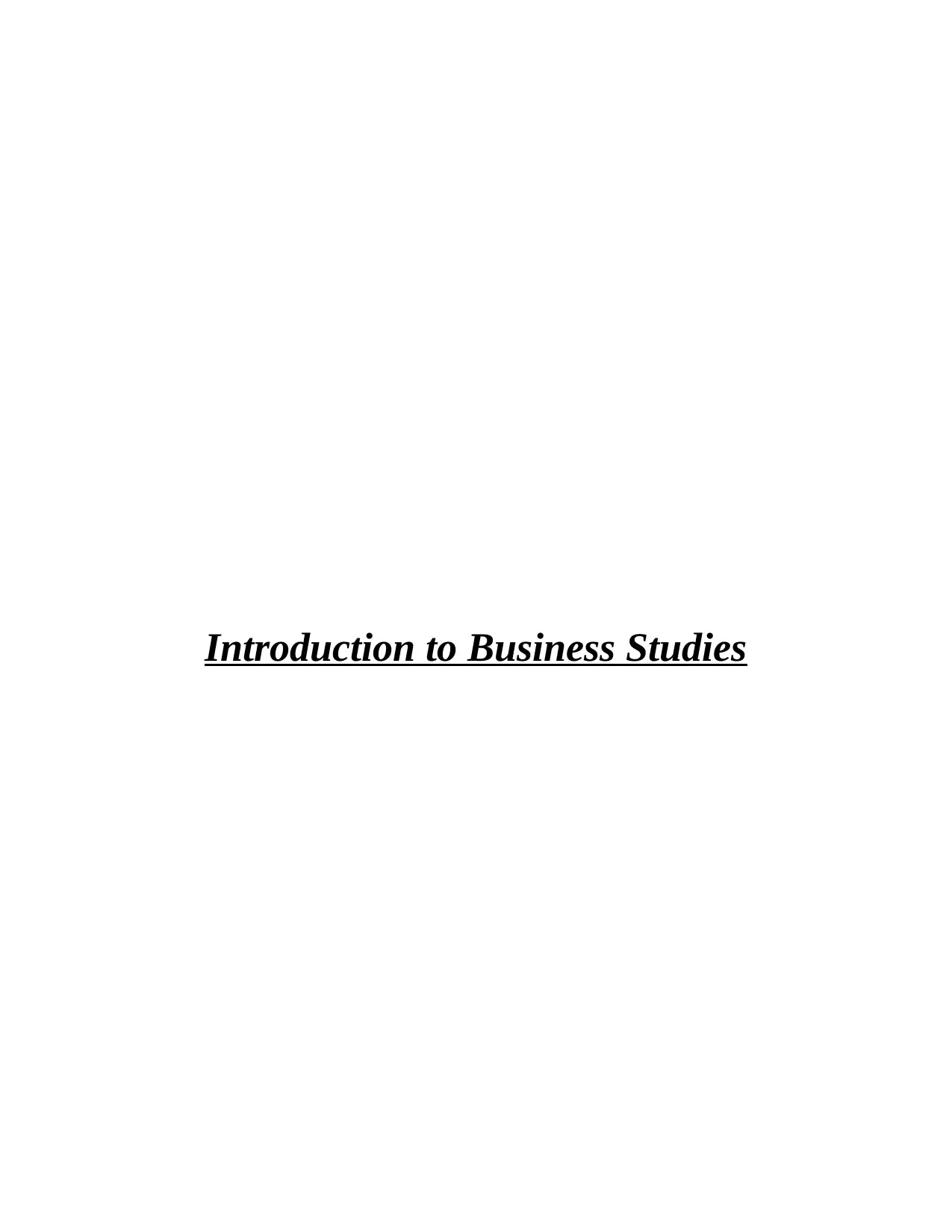
Introduction to Business Studies
Paraphrase This Document
Need a fresh take? Get an instant paraphrase of this document with our AI Paraphraser
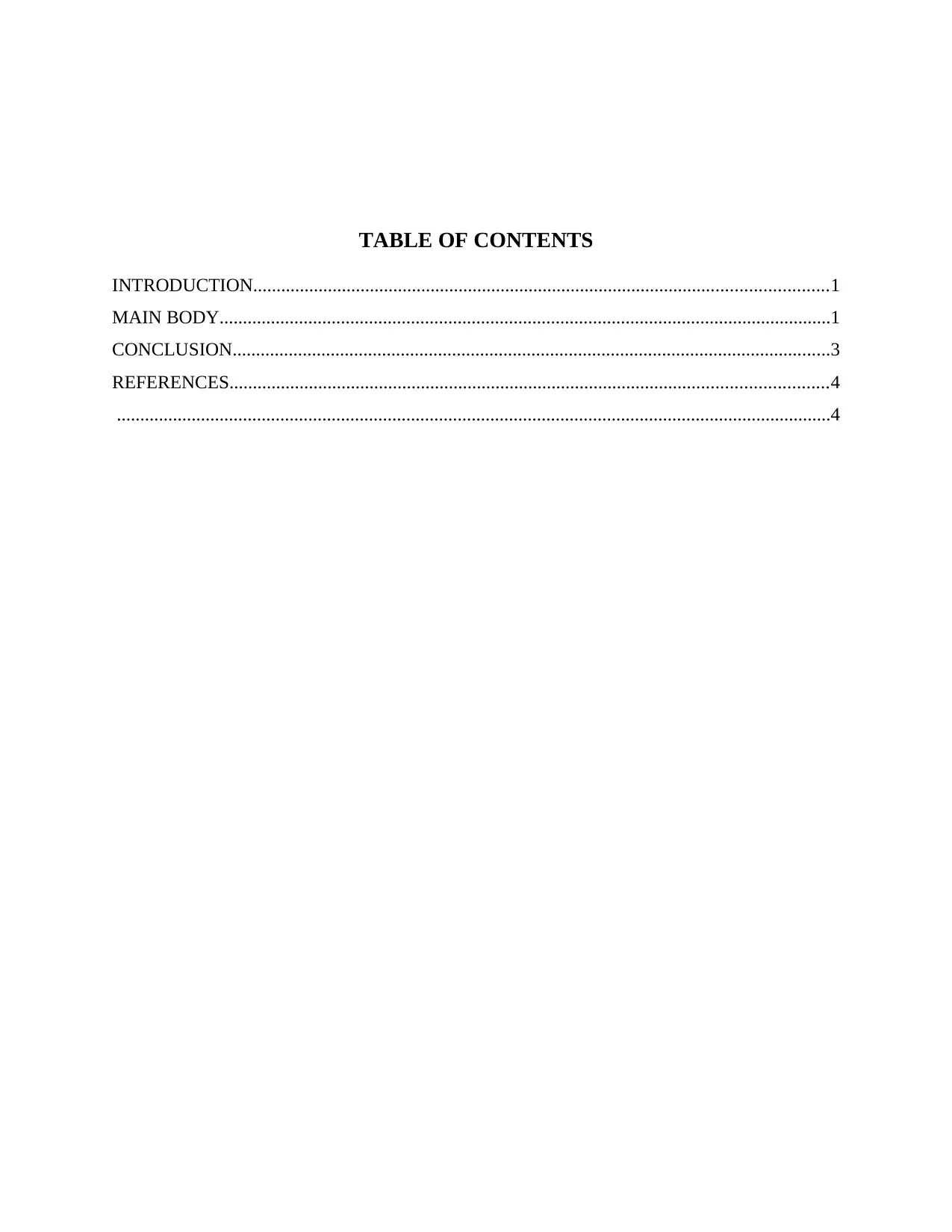
TABLE OF CONTENTS
INTRODUCTION...........................................................................................................................1
MAIN BODY...................................................................................................................................1
CONCLUSION................................................................................................................................3
REFERENCES................................................................................................................................4
.........................................................................................................................................................4
INTRODUCTION...........................................................................................................................1
MAIN BODY...................................................................................................................................1
CONCLUSION................................................................................................................................3
REFERENCES................................................................................................................................4
.........................................................................................................................................................4
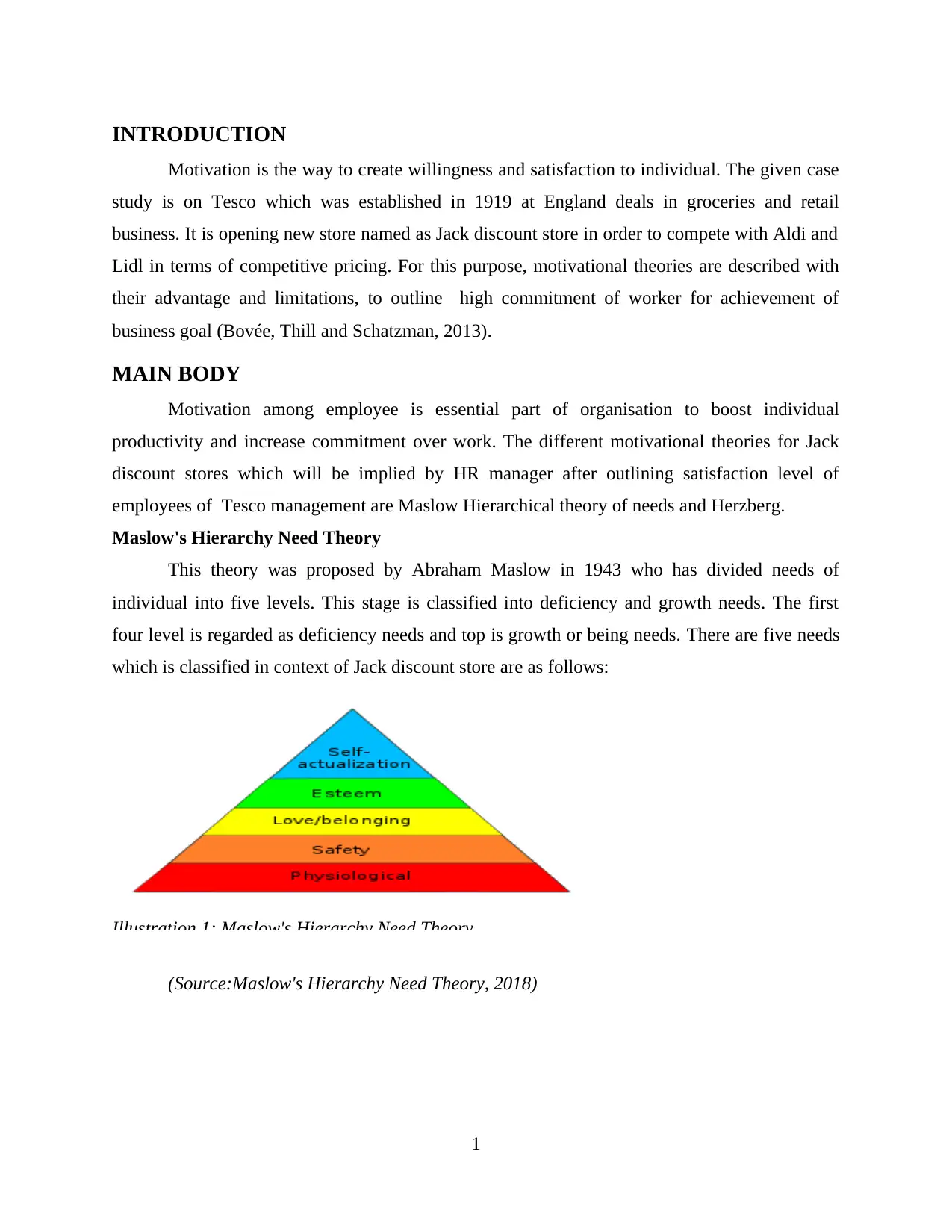
INTRODUCTION
Motivation is the way to create willingness and satisfaction to individual. The given case
study is on Tesco which was established in 1919 at England deals in groceries and retail
business. It is opening new store named as Jack discount store in order to compete with Aldi and
Lidl in terms of competitive pricing. For this purpose, motivational theories are described with
their advantage and limitations, to outline high commitment of worker for achievement of
business goal (Bovée, Thill and Schatzman, 2013).
MAIN BODY
Motivation among employee is essential part of organisation to boost individual
productivity and increase commitment over work. The different motivational theories for Jack
discount stores which will be implied by HR manager after outlining satisfaction level of
employees of Tesco management are Maslow Hierarchical theory of needs and Herzberg.
Maslow's Hierarchy Need Theory
This theory was proposed by Abraham Maslow in 1943 who has divided needs of
individual into five levels. This stage is classified into deficiency and growth needs. The first
four level is regarded as deficiency needs and top is growth or being needs. There are five needs
which is classified in context of Jack discount store are as follows:
Illustration 1: Maslow's Hierarchy Need Theory
(Source:Maslow's Hierarchy Need Theory, 2018)
1
Motivation is the way to create willingness and satisfaction to individual. The given case
study is on Tesco which was established in 1919 at England deals in groceries and retail
business. It is opening new store named as Jack discount store in order to compete with Aldi and
Lidl in terms of competitive pricing. For this purpose, motivational theories are described with
their advantage and limitations, to outline high commitment of worker for achievement of
business goal (Bovée, Thill and Schatzman, 2013).
MAIN BODY
Motivation among employee is essential part of organisation to boost individual
productivity and increase commitment over work. The different motivational theories for Jack
discount stores which will be implied by HR manager after outlining satisfaction level of
employees of Tesco management are Maslow Hierarchical theory of needs and Herzberg.
Maslow's Hierarchy Need Theory
This theory was proposed by Abraham Maslow in 1943 who has divided needs of
individual into five levels. This stage is classified into deficiency and growth needs. The first
four level is regarded as deficiency needs and top is growth or being needs. There are five needs
which is classified in context of Jack discount store are as follows:
Illustration 1: Maslow's Hierarchy Need Theory
(Source:Maslow's Hierarchy Need Theory, 2018)
1
⊘ This is a preview!⊘
Do you want full access?
Subscribe today to unlock all pages.

Trusted by 1+ million students worldwide
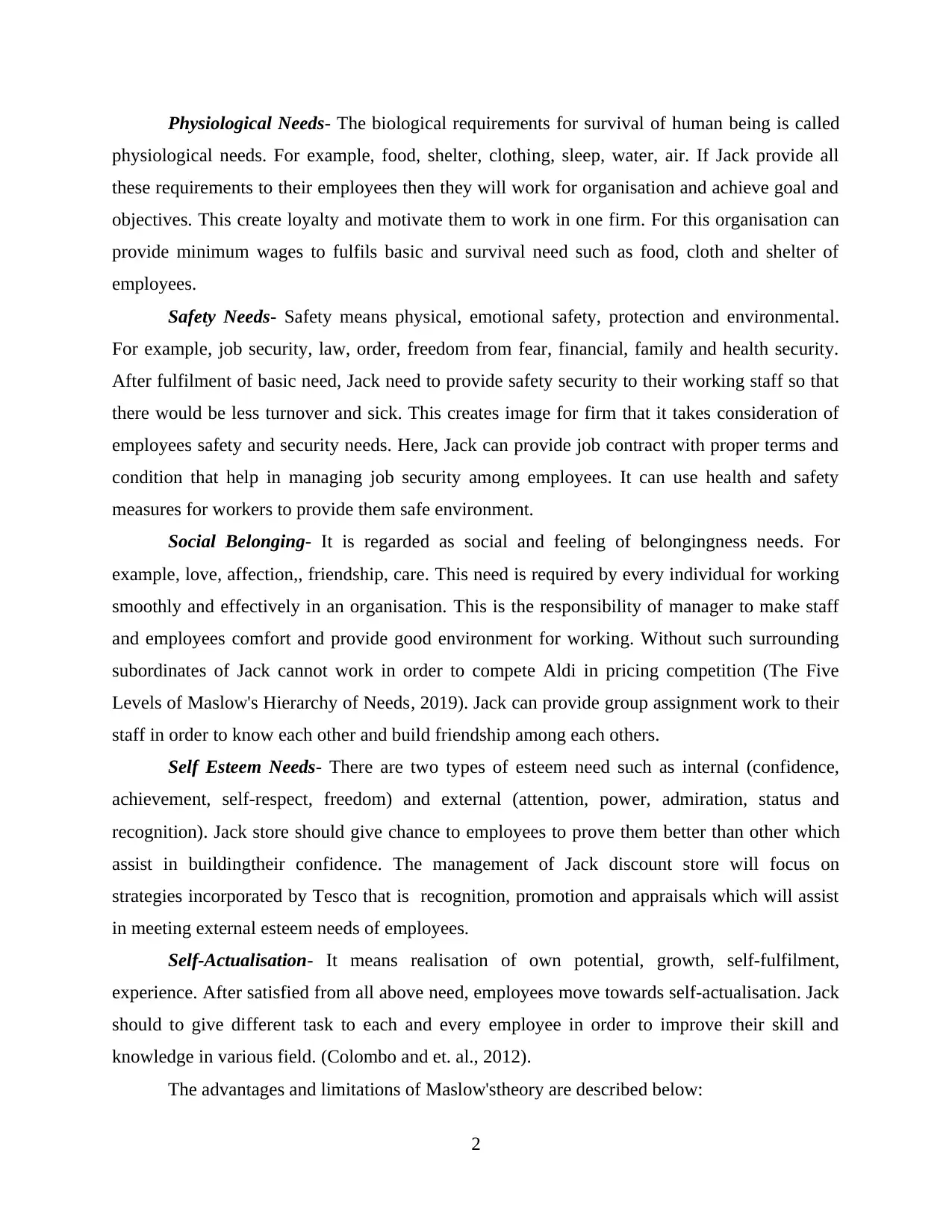
Physiological Needs- The biological requirements for survival of human being is called
physiological needs. For example, food, shelter, clothing, sleep, water, air. If Jack provide all
these requirements to their employees then they will work for organisation and achieve goal and
objectives. This create loyalty and motivate them to work in one firm. For this organisation can
provide minimum wages to fulfils basic and survival need such as food, cloth and shelter of
employees.
Safety Needs- Safety means physical, emotional safety, protection and environmental.
For example, job security, law, order, freedom from fear, financial, family and health security.
After fulfilment of basic need, Jack need to provide safety security to their working staff so that
there would be less turnover and sick. This creates image for firm that it takes consideration of
employees safety and security needs. Here, Jack can provide job contract with proper terms and
condition that help in managing job security among employees. It can use health and safety
measures for workers to provide them safe environment.
Social Belonging- It is regarded as social and feeling of belongingness needs. For
example, love, affection,, friendship, care. This need is required by every individual for working
smoothly and effectively in an organisation. This is the responsibility of manager to make staff
and employees comfort and provide good environment for working. Without such surrounding
subordinates of Jack cannot work in order to compete Aldi in pricing competition (The Five
Levels of Maslow's Hierarchy of Needs, 2019). Jack can provide group assignment work to their
staff in order to know each other and build friendship among each others.
Self Esteem Needs- There are two types of esteem need such as internal (confidence,
achievement, self-respect, freedom) and external (attention, power, admiration, status and
recognition). Jack store should give chance to employees to prove them better than other which
assist in buildingtheir confidence. The management of Jack discount store will focus on
strategies incorporated by Tesco that is recognition, promotion and appraisals which will assist
in meeting external esteem needs of employees.
Self-Actualisation- It means realisation of own potential, growth, self-fulfilment,
experience. After satisfied from all above need, employees move towards self-actualisation. Jack
should to give different task to each and every employee in order to improve their skill and
knowledge in various field. (Colombo and et. al., 2012).
The advantages and limitations of Maslow'stheory are described below:
2
physiological needs. For example, food, shelter, clothing, sleep, water, air. If Jack provide all
these requirements to their employees then they will work for organisation and achieve goal and
objectives. This create loyalty and motivate them to work in one firm. For this organisation can
provide minimum wages to fulfils basic and survival need such as food, cloth and shelter of
employees.
Safety Needs- Safety means physical, emotional safety, protection and environmental.
For example, job security, law, order, freedom from fear, financial, family and health security.
After fulfilment of basic need, Jack need to provide safety security to their working staff so that
there would be less turnover and sick. This creates image for firm that it takes consideration of
employees safety and security needs. Here, Jack can provide job contract with proper terms and
condition that help in managing job security among employees. It can use health and safety
measures for workers to provide them safe environment.
Social Belonging- It is regarded as social and feeling of belongingness needs. For
example, love, affection,, friendship, care. This need is required by every individual for working
smoothly and effectively in an organisation. This is the responsibility of manager to make staff
and employees comfort and provide good environment for working. Without such surrounding
subordinates of Jack cannot work in order to compete Aldi in pricing competition (The Five
Levels of Maslow's Hierarchy of Needs, 2019). Jack can provide group assignment work to their
staff in order to know each other and build friendship among each others.
Self Esteem Needs- There are two types of esteem need such as internal (confidence,
achievement, self-respect, freedom) and external (attention, power, admiration, status and
recognition). Jack store should give chance to employees to prove them better than other which
assist in buildingtheir confidence. The management of Jack discount store will focus on
strategies incorporated by Tesco that is recognition, promotion and appraisals which will assist
in meeting external esteem needs of employees.
Self-Actualisation- It means realisation of own potential, growth, self-fulfilment,
experience. After satisfied from all above need, employees move towards self-actualisation. Jack
should to give different task to each and every employee in order to improve their skill and
knowledge in various field. (Colombo and et. al., 2012).
The advantages and limitations of Maslow'stheory are described below:
2
Paraphrase This Document
Need a fresh take? Get an instant paraphrase of this document with our AI Paraphraser
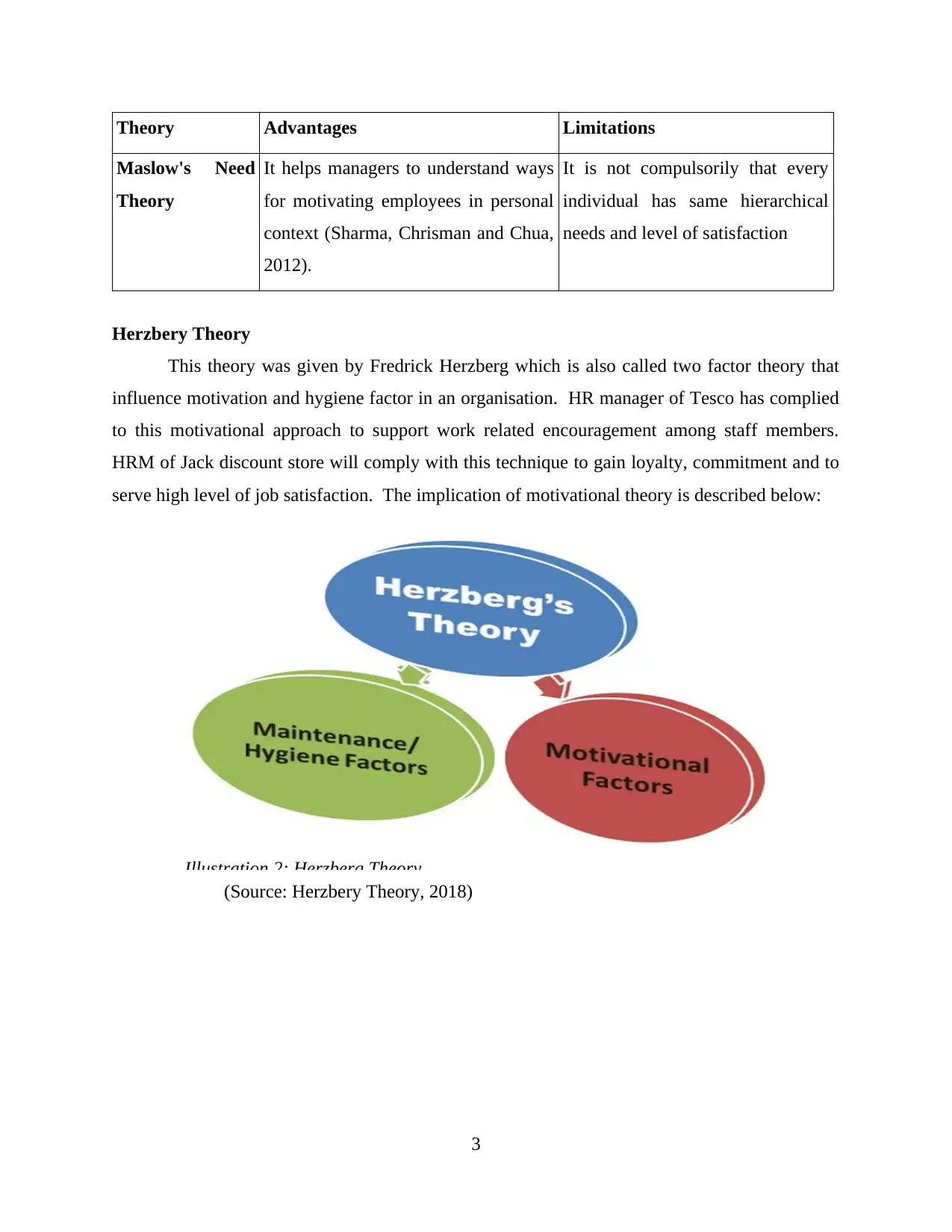
Theory Advantages Limitations
Maslow's Need
Theory
It helps managers to understand ways
for motivating employees in personal
context (Sharma, Chrisman and Chua,
2012).
It is not compulsorily that every
individual has same hierarchical
needs and level of satisfaction
Herzbery Theory
This theory was given by Fredrick Herzberg which is also called two factor theory that
influence motivation and hygiene factor in an organisation. HR manager of Tesco has complied
to this motivational approach to support work related encouragement among staff members.
HRM of Jack discount store will comply with this technique to gain loyalty, commitment and to
serve high level of job satisfaction. The implication of motivational theory is described below:
(Source: Herzbery Theory, 2018)
3
Illustration 2: Herzberg Theory
Maslow's Need
Theory
It helps managers to understand ways
for motivating employees in personal
context (Sharma, Chrisman and Chua,
2012).
It is not compulsorily that every
individual has same hierarchical
needs and level of satisfaction
Herzbery Theory
This theory was given by Fredrick Herzberg which is also called two factor theory that
influence motivation and hygiene factor in an organisation. HR manager of Tesco has complied
to this motivational approach to support work related encouragement among staff members.
HRM of Jack discount store will comply with this technique to gain loyalty, commitment and to
serve high level of job satisfaction. The implication of motivational theory is described below:
(Source: Herzbery Theory, 2018)
3
Illustration 2: Herzberg Theory
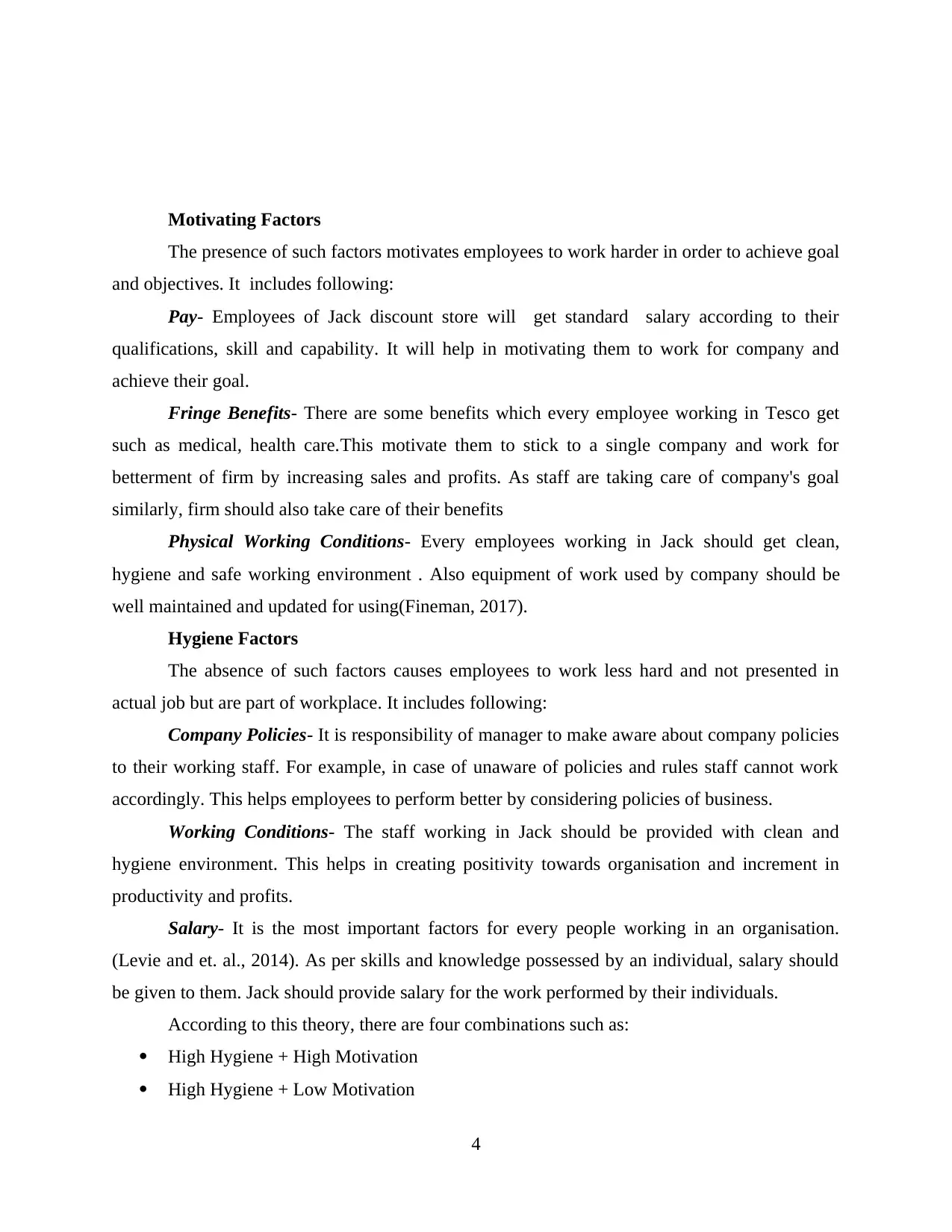
Motivating Factors
The presence of such factors motivates employees to work harder in order to achieve goal
and objectives. It includes following:
Pay- Employees of Jack discount store will get standard salary according to their
qualifications, skill and capability. It will help in motivating them to work for company and
achieve their goal.
Fringe Benefits- There are some benefits which every employee working in Tesco get
such as medical, health care.This motivate them to stick to a single company and work for
betterment of firm by increasing sales and profits. As staff are taking care of company's goal
similarly, firm should also take care of their benefits
Physical Working Conditions- Every employees working in Jack should get clean,
hygiene and safe working environment . Also equipment of work used by company should be
well maintained and updated for using(Fineman, 2017).
Hygiene Factors
The absence of such factors causes employees to work less hard and not presented in
actual job but are part of workplace. It includes following:
Company Policies- It is responsibility of manager to make aware about company policies
to their working staff. For example, in case of unaware of policies and rules staff cannot work
accordingly. This helps employees to perform better by considering policies of business.
Working Conditions- The staff working in Jack should be provided with clean and
hygiene environment. This helps in creating positivity towards organisation and increment in
productivity and profits.
Salary- It is the most important factors for every people working in an organisation.
(Levie and et. al., 2014). As per skills and knowledge possessed by an individual, salary should
be given to them. Jack should provide salary for the work performed by their individuals.
According to this theory, there are four combinations such as:
High Hygiene + High Motivation
High Hygiene + Low Motivation
4
The presence of such factors motivates employees to work harder in order to achieve goal
and objectives. It includes following:
Pay- Employees of Jack discount store will get standard salary according to their
qualifications, skill and capability. It will help in motivating them to work for company and
achieve their goal.
Fringe Benefits- There are some benefits which every employee working in Tesco get
such as medical, health care.This motivate them to stick to a single company and work for
betterment of firm by increasing sales and profits. As staff are taking care of company's goal
similarly, firm should also take care of their benefits
Physical Working Conditions- Every employees working in Jack should get clean,
hygiene and safe working environment . Also equipment of work used by company should be
well maintained and updated for using(Fineman, 2017).
Hygiene Factors
The absence of such factors causes employees to work less hard and not presented in
actual job but are part of workplace. It includes following:
Company Policies- It is responsibility of manager to make aware about company policies
to their working staff. For example, in case of unaware of policies and rules staff cannot work
accordingly. This helps employees to perform better by considering policies of business.
Working Conditions- The staff working in Jack should be provided with clean and
hygiene environment. This helps in creating positivity towards organisation and increment in
productivity and profits.
Salary- It is the most important factors for every people working in an organisation.
(Levie and et. al., 2014). As per skills and knowledge possessed by an individual, salary should
be given to them. Jack should provide salary for the work performed by their individuals.
According to this theory, there are four combinations such as:
High Hygiene + High Motivation
High Hygiene + Low Motivation
4
⊘ This is a preview!⊘
Do you want full access?
Subscribe today to unlock all pages.

Trusted by 1+ million students worldwide
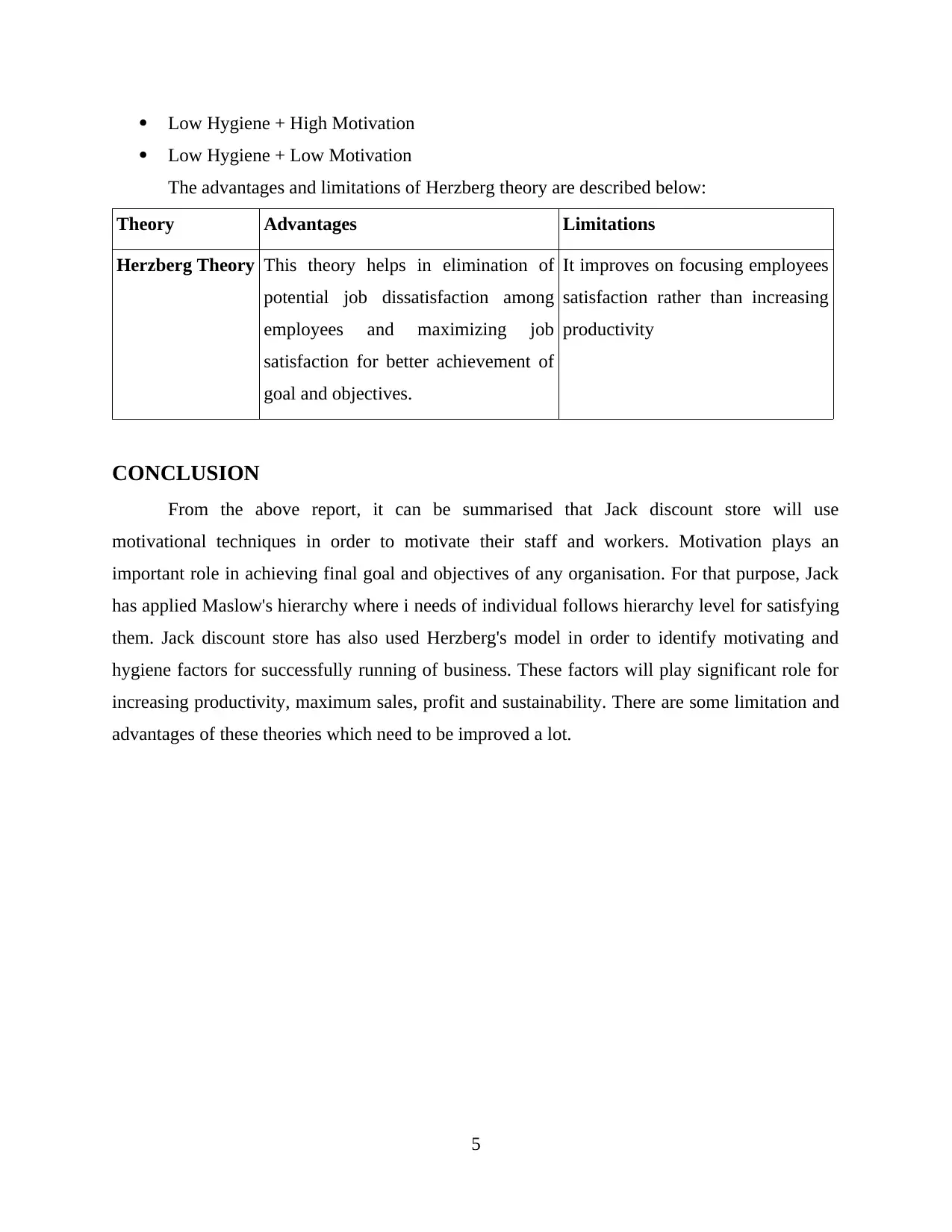
Low Hygiene + High Motivation
Low Hygiene + Low Motivation
The advantages and limitations of Herzberg theory are described below:
Theory Advantages Limitations
Herzberg Theory This theory helps in elimination of
potential job dissatisfaction among
employees and maximizing job
satisfaction for better achievement of
goal and objectives.
It improves on focusing employees
satisfaction rather than increasing
productivity
CONCLUSION
From the above report, it can be summarised that Jack discount store will use
motivational techniques in order to motivate their staff and workers. Motivation plays an
important role in achieving final goal and objectives of any organisation. For that purpose, Jack
has applied Maslow's hierarchy where i needs of individual follows hierarchy level for satisfying
them. Jack discount store has also used Herzberg's model in order to identify motivating and
hygiene factors for successfully running of business. These factors will play significant role for
increasing productivity, maximum sales, profit and sustainability. There are some limitation and
advantages of these theories which need to be improved a lot.
5
Low Hygiene + Low Motivation
The advantages and limitations of Herzberg theory are described below:
Theory Advantages Limitations
Herzberg Theory This theory helps in elimination of
potential job dissatisfaction among
employees and maximizing job
satisfaction for better achievement of
goal and objectives.
It improves on focusing employees
satisfaction rather than increasing
productivity
CONCLUSION
From the above report, it can be summarised that Jack discount store will use
motivational techniques in order to motivate their staff and workers. Motivation plays an
important role in achieving final goal and objectives of any organisation. For that purpose, Jack
has applied Maslow's hierarchy where i needs of individual follows hierarchy level for satisfying
them. Jack discount store has also used Herzberg's model in order to identify motivating and
hygiene factors for successfully running of business. These factors will play significant role for
increasing productivity, maximum sales, profit and sustainability. There are some limitation and
advantages of these theories which need to be improved a lot.
5
Paraphrase This Document
Need a fresh take? Get an instant paraphrase of this document with our AI Paraphraser
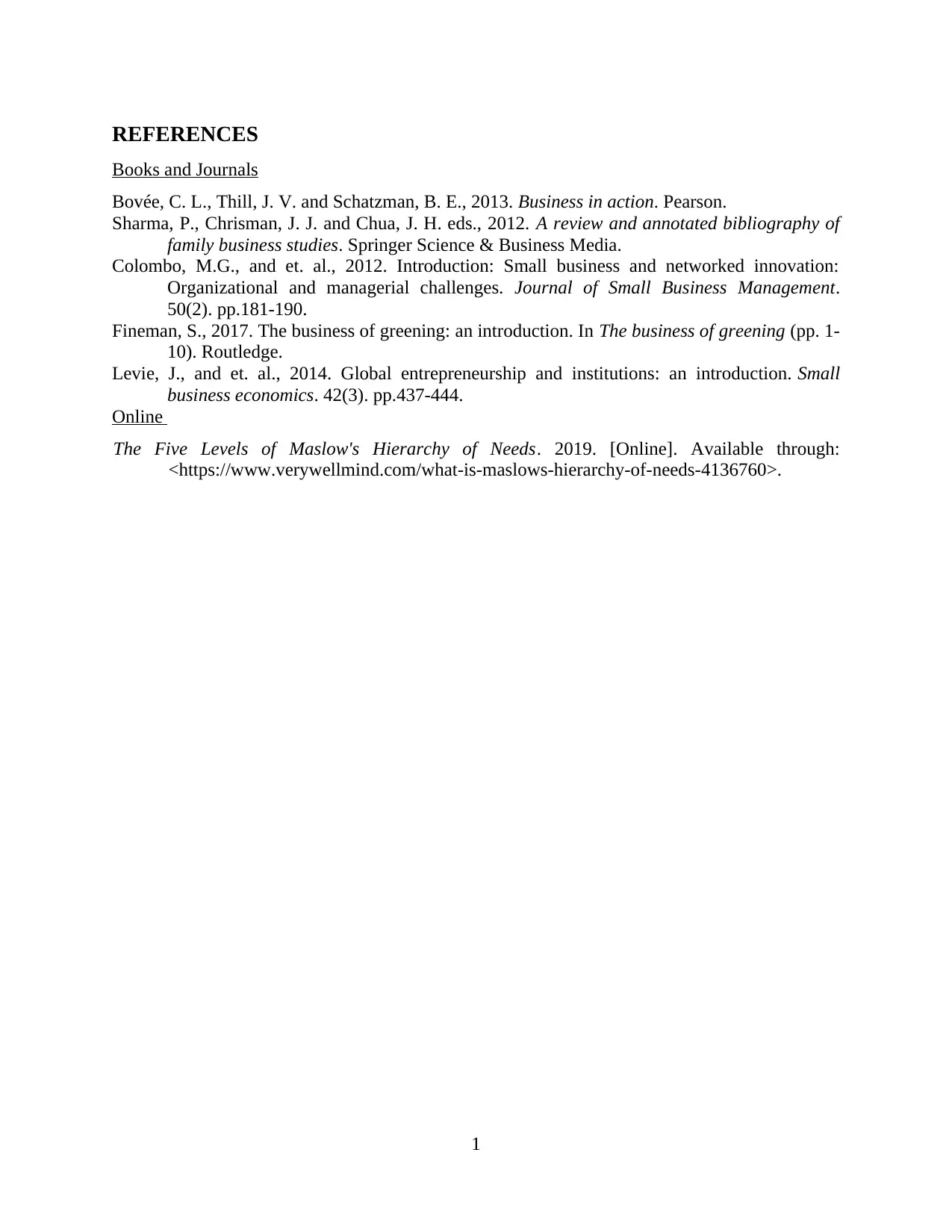
REFERENCES
Books and Journals
Bovée, C. L., Thill, J. V. and Schatzman, B. E., 2013. Business in action. Pearson.
Sharma, P., Chrisman, J. J. and Chua, J. H. eds., 2012. A review and annotated bibliography of
family business studies. Springer Science & Business Media.
Colombo, M.G., and et. al., 2012. Introduction: Small business and networked innovation:
Organizational and managerial challenges. Journal of Small Business Management.
50(2). pp.181-190.
Fineman, S., 2017. The business of greening: an introduction. In The business of greening (pp. 1-
10). Routledge.
Levie, J., and et. al., 2014. Global entrepreneurship and institutions: an introduction. Small
business economics. 42(3). pp.437-444.
Online
The Five Levels of Maslow's Hierarchy of Needs. 2019. [Online]. Available through:
<https://www.verywellmind.com/what-is-maslows-hierarchy-of-needs-4136760>.
1
Books and Journals
Bovée, C. L., Thill, J. V. and Schatzman, B. E., 2013. Business in action. Pearson.
Sharma, P., Chrisman, J. J. and Chua, J. H. eds., 2012. A review and annotated bibliography of
family business studies. Springer Science & Business Media.
Colombo, M.G., and et. al., 2012. Introduction: Small business and networked innovation:
Organizational and managerial challenges. Journal of Small Business Management.
50(2). pp.181-190.
Fineman, S., 2017. The business of greening: an introduction. In The business of greening (pp. 1-
10). Routledge.
Levie, J., and et. al., 2014. Global entrepreneurship and institutions: an introduction. Small
business economics. 42(3). pp.437-444.
Online
The Five Levels of Maslow's Hierarchy of Needs. 2019. [Online]. Available through:
<https://www.verywellmind.com/what-is-maslows-hierarchy-of-needs-4136760>.
1
1 out of 8
Related Documents
Your All-in-One AI-Powered Toolkit for Academic Success.
+13062052269
info@desklib.com
Available 24*7 on WhatsApp / Email
![[object Object]](/_next/static/media/star-bottom.7253800d.svg)
Unlock your academic potential
Copyright © 2020–2026 A2Z Services. All Rights Reserved. Developed and managed by ZUCOL.





